Romeo
Red & Rust Male Doberman out of Scarlett's 2nd Litter
(Born April 1, 2006)
|
Romeo went to live in Austin, Texas with Richard, Teresa and their family.
|
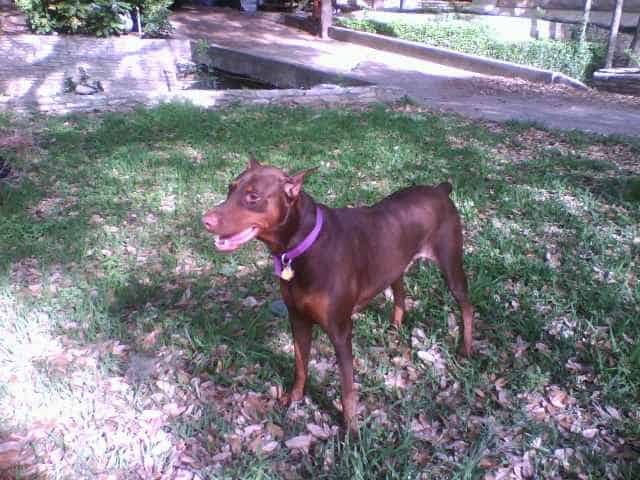
April 1, 2008 -
"Laura,
Here are some pictures I took of Romeo on his birthday in our front yard. He won't stand still long enough to get really good shots, but some are better than nothing, I guess!
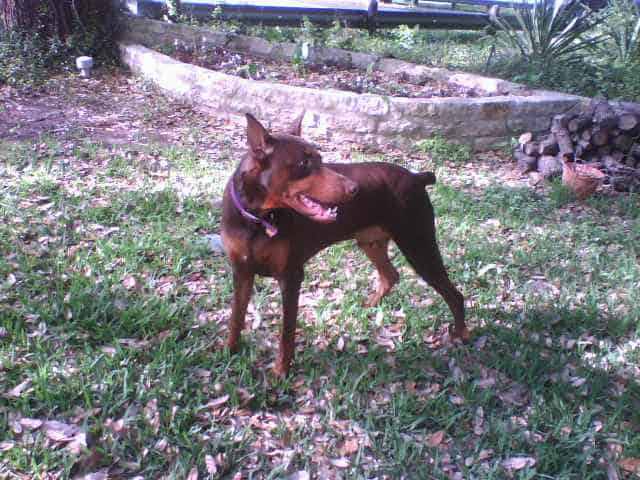
I'm still experiencing problems with him. I've hired a trainer and we are continuing to do what we can in order to have him remain a member of our family, but as I've told you, as sweet as he is, he is very hard headed and is too aggressive at times. Hopefully, we will be able to contain that. Hope you enjoy.
Teresa"
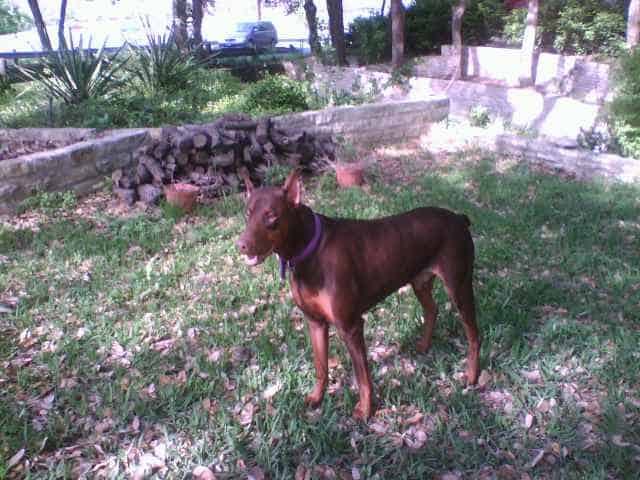
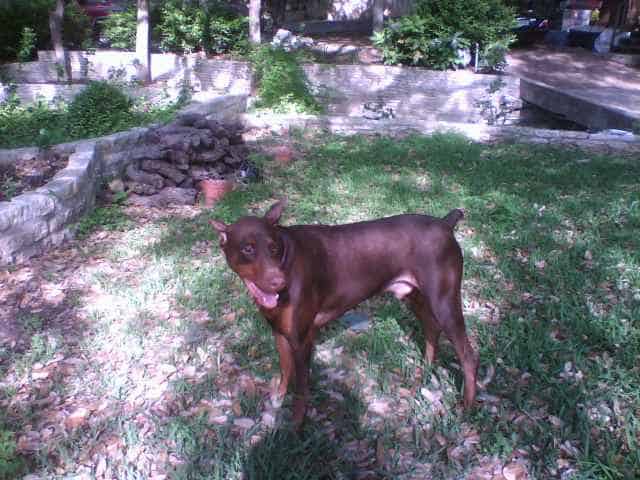
RESPONSE:
"Teresa,
Thanks for the pics and update! I have very often thought about you and wondered how things were going. It is so strange the problems you have with him. This is an isolated incident and it drives me nuts! What does the trainer say? Just curious what the thought is there on why the problems. --Laura"
|
Pet Tips -- Puppy-hood and Beyond
Puppy-hood and beyond puppies are growing animals. When they are young, they learn much and what is learned has a lasting impact. Even sexual patterns, which emerge as puppies mature, can be affected by early experience. All dogs, regardless of breed, pass through various stages as they grow and develop, physically, mentally, and psychologically. Psychologists use the term critical period to describe a specific time in a dog's life when certain experiences have a lasting effect upon their psychological development. Understanding these critical periods and a dog's stages of development will better help you to understand your dog's behavior and how to handle him during these special times. Additionally, puppies benefit greatly when their owners understand their development.
Puppy Toddlers (3 - 6 Weeks) -- During the Toddler period, puppies emerge on their own from the litter. They venture into the surrounding environment. This emergence from the litter is a gradual and continual learning experience. During this stage of development puppies learn basic behavioral patterns specific to dogs. While playing, they practice different body postures, learning what the postures mean and how they affect their mother and litter mates. They learn what it is like to bite and be bitten, what barking and other vocalizations mean and how to make and use them to establish social relationships with other dogs. Such learning and activity tempers their own biting and vocalizing. From the age of five weeks, the mother teaches her puppies basic manners. They learn to be submissive to her leadership and what behaviors are acceptable. If necessary, she growls, snarls, or snaps at them as a form of discipline. When weaning the litter, for instance, the mother will discipline her puppies so that they will leave her alone. Because the mother disciplines them in a way that they clearly understand, after a few repetitions, the puppies will respond to a mere glare from her. If a pup has not learned to accept leadership (and discipline) in its early interactions with dogs, its training will be more difficult. Puppies that are removed from the nest too early tend to be nervous, more prone to barking and biting, and less responsive to discipline. Often they are aggressive with other dogs. Generally speaking, a puppy taken away from it's mother and litter mates before seven weeks of age, may not realize its full potential as a dog and companion. To maximize the mental and psychological development of puppies, they must remain in the nest with their mother and litter mates until seven weeks of age.
Socialization Period (7 - 12 Weeks) -- It is at this age that rapid learning occurs. At seven weeks, puppies can learn and what they learn will have a lasting impact. Everything he comes in contact with will make a lasting impression upon him as it never will again. Not only will he learn, but, he will learn whether he is taught or not. Though he has a short attention span, what things he learns are learned permanently and resistant to change. Therefore, owners need to be careful about what their puppies are learning at this time. Your puppy is very anxious to learn how you want him to behave and react, and he needs to be shown what is expected of him in his new role as your pet. There are rules you will expect your puppy to obey. Establish those rules NOW while behaviors are easy to establish. For instance, how your pet interacts with you is determined during puppy-hood. What he does now is what he will likely do later. So, don't allow your puppy to do things which will be unacceptable when he becomes a dog. During this time, you and your puppy will also begin to know and understand each other. You will get to know about your puppy's particular temperament and personality - whether he is strong-willed or eager to please, gentle or rambunctious, shy or outgoing, and just what else makes him the endearing individual that he is. For the puppy, this is both an exciting and somewhat confusing time. There is a whole new world of things to learn about and all sorts of new experiences to digest. Remember that the environments you put your puppy in are more complex than those he would encounter naturally. Puppies must now learn a new set of rules. He needs to know learn how to interact with humans and other animals who live with them. Puppies must adapt to the patterns and tenor of their new homes. All of these experiences and the behaviors which accompany them, must be learned. Because you will impose such important demands on your puppy, you must help him to make the transition into the human environment. You need to lay a groundwork for a trusting, happy mutually satisfying relationship. Keep in mind that puppies are less likely to broaden their experiences if they are insecure. In natural environments, puppies approach new things cautiously. By giving your puppy brief, repeated experiences in new situations, you give him a chance to become familiar. If you don't expose your puppy to a variety of situations and new environments, inappropriate ways to adapt may be learned. During the Socialization period, there is a fear imprint period from 8 - 11 weeks. During this time, any traumatic, painful or frightening experiences will have a more lasting impact on your pup than they would if they occurred at any other time. An unpleasant trip to the veterinarian, for instance, at this time could forever make your dog apprehensive about vets. To avoid this, take some treats and a toy with you. While you wait, play with your puppy and offer him treats. Have your vet give your puppy treats along with lots of praise and petting before and after the examination. Avoid elective surgeries, such as ear-cropping and hernia repair during this time. In general, avoid stressful situations. Remember, dogs are social animals. To become acceptable companions, they need to interact with you, your family, and other people and dogs during the Socialization Period. Dogs that are denied socialization during this critical period often become unpredictable because they are fearful or aggressive. It is during this time, that your dog needs to have positive experiences with people and dogs. Therefore, you need to socialize and teach your puppy how to interact with people and other dogs in a positive, non-punitive manner. You should gradually introduce your puppy to new things, environments, and people. But, care must be taken in socializing your puppy with other dogs or in areas where many "unknown" dogs frequent, prior to the time that your dog has had three of its booster vaccinations against contagious diseases. Shopping centers, parks, and playgrounds are good places to expose him. Begin by taking your puppy when there are few distracters. Give him time to get used to new places. Make sure he is secure. If you have children that visit only occasionally, have your puppy meet children as often as you can. If you live alone, make an effort to have friends visit you, especially members of the opposite sex so that your dog will become accustomed to them. If you plan on taking your dog to dog shows or using your dog in a breeding program, get him around other dogs. If you plan to travel with your dog, get him accustomed to riding in the car. Take him for brief rides, at first. Go someplace fun. Remember, if new experiences are overwhelming or negative, the results could be traumatic.
Seniority Classification Period (12-16 Weeks) -- It is during this critical period that your dog will begin to test you to see who the pack leader is going to be. He'll begin to bite you, in play or as a real challenge to your authority. Such behavior is natural in the pack and not necessarily undesirable. What is undesirable is an inappropriate response on your part. It is important, at this stage, that you establish your position as pack leader, and not just another sibling. Other behaviors, such as grabbing at the leash, will be observed, and all are attempts to dominate you. Biting , in particular though, should always be discouraged. Therefore, you should not wrestle or play tug of war. Such play is aggressive-inducing. What you see as a fun game may be perceived by your dog as a situation in which he has been allowed to dominate. Wrestling, of course, communicates to your puppy that he is allowed to bite you. Tug of war sets you up in a dominance confrontation over an object. He learns that he can keep objects away from you. During tug of war games, puppies will often growl. Growling is a dominance vocalization, designed to warn another pack member that they better not confront the growler or he will bite. Puppies see these games as situations in which they have been allowed to dominate. They do not understand that these are games designed by humans to entertain them. You can continue to play with your dog during this period, but, the relationship between you during the play must change. No mouthing of your body should be allowed and when your dog does mouth, you should respond with a quick and sharp "NO!" or "No Bite!" Play that does not get rough is best. If you cannot keep the dog from getting overly excited during a game and he persists in biting at you, don't play that way. This will only stimulate additional dominant behavior in the future. For these reasons, this is the stage when serious training should begin. Training establishes your pack leadership in a manner that your puppy will understand. By training your puppy, you will learn how to get him to respond to commands designed to show that you are in charge.
Flight Instinct Period (4 - 8 Months) -- This is the age when puppies become more independent of their owners and are likely to venture off on their own. Puppies that have always come when called or stayed close to their owners will now ignore them, often running in the opposite direction. This period can last from several weeks to months. How you handle your puppy's refusal to come or stay with you will determine whether or not he will be trustworthy off leash. It is important to emphasize here that no puppy this young should ever be off leash except in a confinement area. Therefore, keep your puppy on leash when this period arises and keep him on leash until he readily returns to you or shows no inclination to leave you. The privilege of being off leash outside of a confined area, is reserved for dogs whose owners have trained them to the point where there is no potential for them to run and fail to obey to stop or come on command. Releasing an unleashed dog in an unconfined area that is not well trained off leash is irresponsible ownership and dangerous to your dog. Even well trained dogs can make mistakes or become distracted by something in the environment so that they do not respond to their owners' commands. So, how do you respond when your puppy suddenly develops the urge to bolt? First, you must, for his safety, put a leash or a long line on your dog whenever you are not in a confined area. Second, work hard on training your puppy to come on command. Use the recall game and the spontaneous recall. When walking your dog, suddenly run backwards and encourage your puppy to come. If your dog still continues to bolt or run away, then your dog probably does not view you as the dominant figure in this relationship and you require special help to resolve this problem. Even if the your puppy appears less inclined to bolt, this does not mean that he is reliable off lead without more maturity and a lot more training.
Adolescence Period (5 - 18 months) -- Adolescence can appear in smaller dogs as early as five months. In larger breeds, it can start as late as nine or ten months. In giant breeds, adolescence doesn't take place until twelve to eighteen months. In general, the larger the dog, the longer it will take to physically mature. Some breeds can remain adolescents until they are two and a half, or three years old. Adolescence is expressed in male dogs by scent marking behavior. Scent marking behavior is stimulated by the release of testosterone into the dog's system. At this time, males may become macho. Male dogs may become less friendly and even somewhat aggressive to other male dogs. He may begin lifting his leg in the house. He may become very interested in girls, tend to roam, and certainly not interested in listening to you! Some males at this age become totally unruly. In females, adolescence is marked by the onset of the heat cycle, estrus. During this three week period, your bitch could become pregnant. So, keep her away from all male dogs. Bitches exhibit erratic behavior during estrus. Some get real moody and insecure. Others become quite bold or even aggressive. Adolescence is a very difficult time for pet owners. They are surprised when their cute little puppy becomes a free and independent thinker. Adolescence is certainly a good time to start (or reinstitute) rigorous training. You must work hard NOW to mold the dog of your dreams. This course will teach you training methods which are based on sound knowledge of dog behavior. You will gain knowledge about dog behavior and training techniques. This knowledge will help you to get through your dog's adolescence. A dog that you view as too stupid, too old or stubborn or too spiteful can become a well mannered, enjoyable, and reliable companion. Establish yourself as the leader of the pack. Be realistic about your expectations. You cannot expect young dogs to grow up overnight. Learn to appreciate your dog's adolescence for it is a truly wonderful time. At this time of their lives, dogs are very energetic and exuberant in their responses. They can be full of beans, but still, delightful playmates. You as the owner must learn to channel that energy and exuberance into learning, working, exercising, and playing games. It is not too late to train (or retrain) your dog to help him to become a long-lasting companion.
Second Fear Imprint Period (6 - 14 Months) -- The Second Fear Imprint Period is similar to the one that occurred during the socialization period, but, it is much less defined. It occurs as dogs enter adolescence and seems more common in males. It is often referred to as adolescent shyness. Your dog may suddenly become reluctant to approach something new or suddenly become afraid of something familiar. This behavior can be very frustrating to the owner and difficult to understand because its onset is so sudden and, seemingly, unprovoked. If you notice this behavior, it is important to avoid the two extremes in response: Don't force him to do or approach something frightening to him and don't coddle or baby him. To get through situations that make your dog fearful, be patient, kind, and understanding. Desensitize him to the object or situation by gradually introducing him to it and using food rewards and praise to entice him to confront the fearful object or situation. Do not coddle or reassure him in any way that will encourage his fearful behavior. Do not correct him either. Simply make light of it and encourage him give him food rewards as he begins to deal with his fear better. Make sure you lavishly praise his attempts! This phase will pass.
Mature Adulthood (1 - 4 Years) -- During this period your dog may again become aggressive and assertive. For instance, he may become more turf-protective, by barking when someone comes to the door. Temper his protective behaviors by teaching him how to accept strangers into your home. His friendly play with other dogs may escalate to fighting with other dogs. Teach you dog to ignore other dogs that he sees if he can't be friendly towards them. Take him to places where there will be a few dogs at first and train him there. Then, train him in areas with more and more dogs. Next, allow him to interact with non threatening dogs. Puppies and bitches are good choices, if he is a male. Always praise his positive efforts to interact or if he displays no reaction. Gradually move onto male dogs. At bit of caution here, adult members of the same sex, no matter what animals species, tend to compete with one another. Putting together two strange adults of the same sex could result in a fight. Watch for behavioral signs of playfulness before allowing two dogs to play together. Also, be alert to the posturing of aggressive behaviors. Watch for circling behaviors, walking on toes, stiff tail wags, and tense facial expressions. Adulthood is also a time that your dog may again test your position as pack leader. If he does, handle him firmly, suspend any rough play that may be giving him the idea that he can dominate you, and continue with training. Additional classes or private help with training may be a wise investment. It can provide you with the structure and commitment to train him that you need at this time. Proceed with training in a matter-of-fact, no nonsense manner and your dog will become a reasonably obedient dog. Give him lots of positive attention for his efforts!
Closing Remarks: This has been a cursory look at some of the behavioral changes that often occur during puppy-hood, adolescence, and early adulthood. Other problems may arise at these stages which are not the result of the developmental period itself, but are caused by something in the environment or the dog's basic personality. Even so, they are probably aggravated by immaturity and you cannot afford to overlook them. Understanding, training, and perhaps professional help with training are the keys to success. All dogs are different. Some will not exhibit the behaviors we have discussed and others will pass through them at varying rates with smaller dogs maturing faster than large dogs. Remember that your dog needs you to play a role in his development and you can do that with knowledge and commitment to training. Learning plays a significant role in a dog's development. Through training, you actively take part in that process. This course has been carefully designed with the capacities of developing dogs in mind. Throughout the course, you and your dog will be observed. You will be advised if your dog exhibits behaviors which may be warning signs of potential problems. We will teach you exercises which will help your dog to be a good companion. The exercises your dog or puppy will learn should not tax him. Learning can be fun and each dog can achieve success.
-----------------------------------------
I am working on my first option for you should you want to move forward with placing him in another home. Think it over ... Again, I am sorry things aren't work out.
Laura"
REPLY BACK:
"Laura,
I talked with Richard today and I have decided that I am not ready to let go of Romeo at this point. The situation is every bit of what I explained to you, however, after reading your e-mail and the thought of actually placing him in another home, I was absolutely reduced to tears. I am very firm with my discipline - as I've told you I've had dogs my entire life, and I have never experienced anything like this either. He is very headstrong and often when he is disciplined, he will bark back at you (and trust me, he knows I'm not playing). I am extremely frustrated over his behavior, but I also love him like a child. As I said previously, he is very smart so it is just confusing as hell to me why he doesn't get it yet.
I appreciate you taking time to try and help me. I'm just going to keep working with him, and hopefully, he'll snap out of it. I'll probably seek a professional and maybe that will work. If not, I'll let you know.
Just FYI, his ears did take longer to stand than anticipated (about 4 months). One ear kept wanting to fall but it eventually stood and now they are very strong and beautiful (along with the rest of him). He is big - around 90 lbs on his last weight check. He is scheduled for his annual exam next week so we'll see if he has gotten any bigger. He has been microchipped (with Home Again) since he was a pup.
Thanks again. I'll keep you posted our progress (and hopefully we'll have some).
Teresa"
|
October 9, 2006 -
"He is HUGE! Last weight was over 70 lbs. and that was a few weeks ago. Not too bad for only 6 months old (and barely that! HA!) He is a HANDFUL but just adorable. Drives me crazy... HA! He is very headstrong, but I think that will be to all of our benefit as he gets older. AND.....did I say......he is incredibly gorgeous!!!!
I'll try to send you some updated pics soon.
Good to hear from you and I'll be back in touch in a couple of weeks.
Teresa"
REPLY BACK:
"Love it! Thanks for the update!
I will look forward to the pictures. --Laura"
|
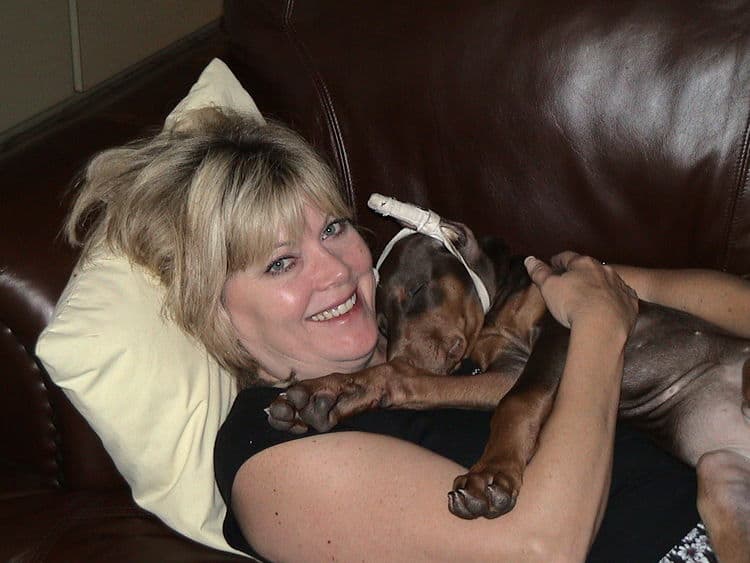
June 30, 2006 -
"Hi Laura,
Sorry it has taken so long to get you some pictures of little beauty boy. I forgot how busy a new pup makes your life - just like having another baby! HA! He is SO gorgeous and sweet and just into everything!
He is putting on weight like there is no tomorrow. A few weeks ago he weighed in at 21 lbs. and just a few days later we were at the vet who is doing his ear follow up and he weighed in at 26.8 lbs. Last Friday he weighed in at 30 lbs. So, no telling what he will be for his appointment tomorrow to have his ears checked. The little horse! HA! His ears are standing fairly well, and we thought that the tape could stay off on our visit before last, but they fell so we are anticipating about another week or so before it comes off for good.
Our other dog Skippy is having a blast with him. It is really fun to watch them play because in just a few weeks he was taller than her so now he just goes up and stands over her to play. She still thinks she is the boss, but we keep telling her it is just a matter of time! HA! He gets along well with most of our cats, however, he thinks our black cat Jaguar is his play toy. We have to remind him that he can't drag Jaggie around by his neck!
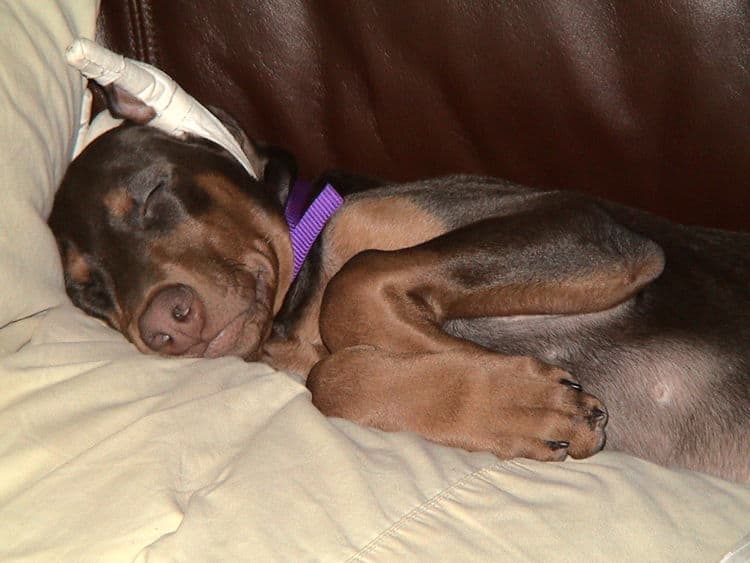
I'll send you more pictures soon (hopefully he'll be awake in them). It is hard to get him to settle down long enough to take a picture because he is just TOO BUSY playing! His routine has remained the same -- eat a lot, play a lot, sleep a lot! Then it is time to start is all over again! HA!
It has been so fun to watch him develop. My only regret is that it is going by so fast and he isn't little anymore! Boo hoo! My baby is growing up too fast!!
His next round of shots is scheduled July 11th and rabies shot will be given at that time. He has already been microchipped and he didn't like that one little bit!!
He has added so much to our lives, Laura, so I just want to thank you again. We truly feel so blessed to have our precious Romeo.
Take care until I talk to you again....
Teresa"
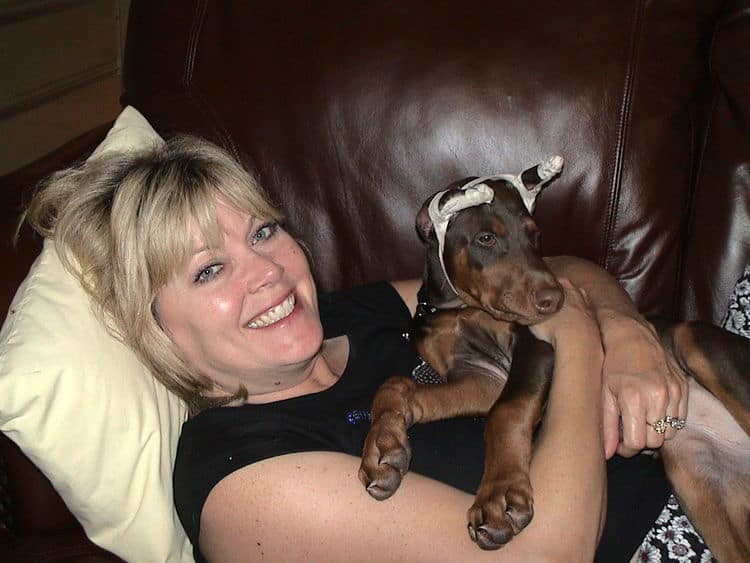
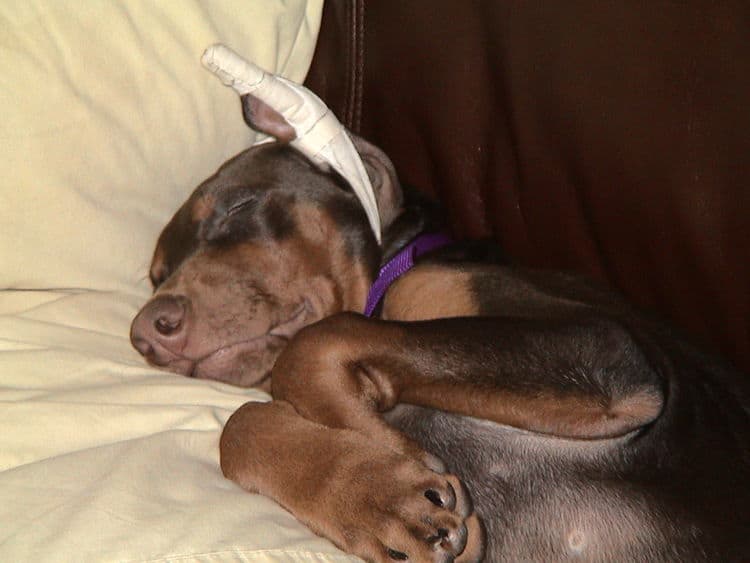 |
"Hello Laura,
Here are some pictures of beauty boy:
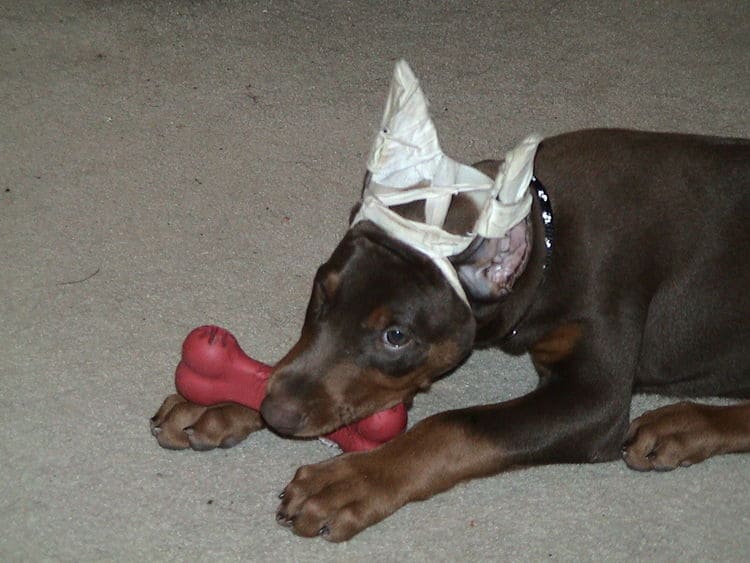
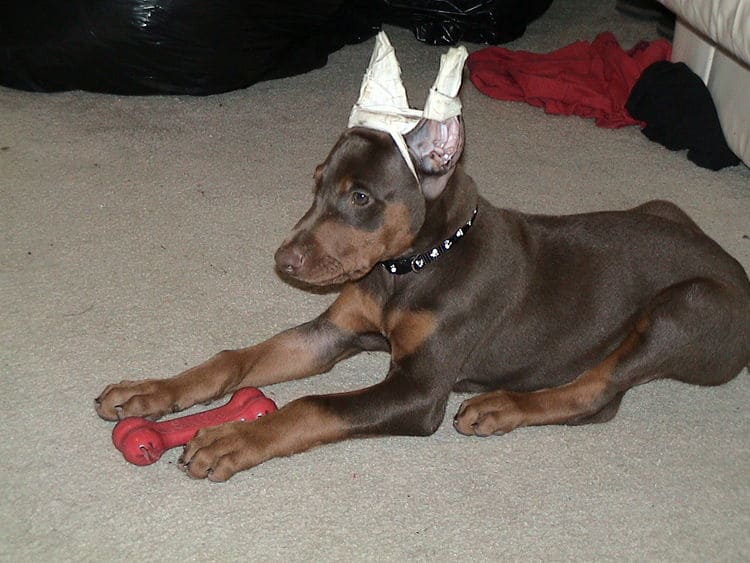
All went well yesterday when his ears got taped. Poor baby, just when he got the crown off and got used to his little flappers - now he is confused again!
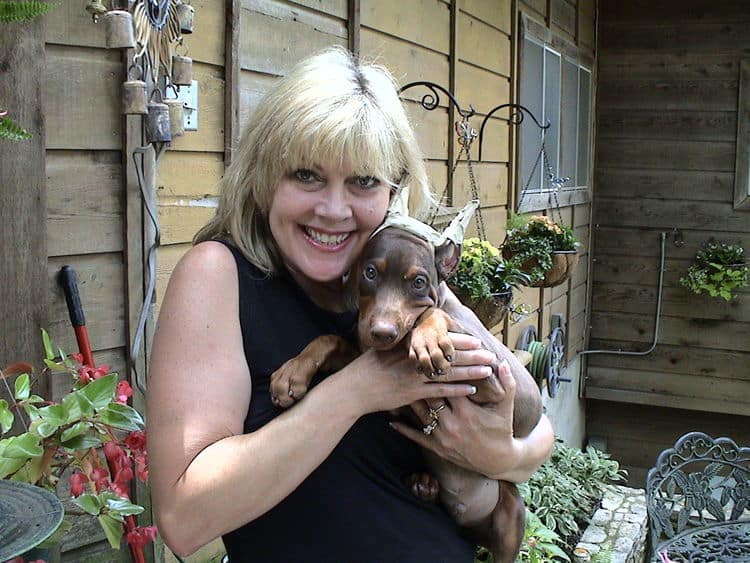
He is doing great and is so affecitionate and what a pooper! HA! He is learning his name and you know that "no dog in the bed" thing? Well, it is totally out the window! HA!
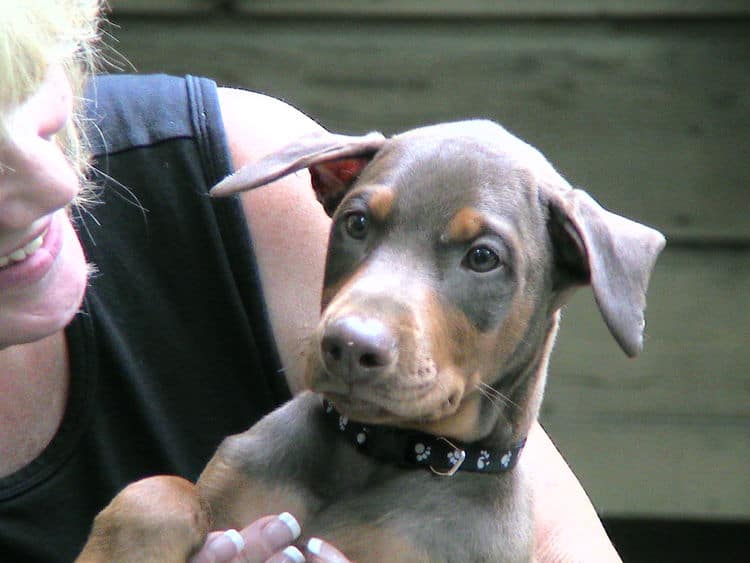
I'll send you some of him with his little ears taped as soon as Richard takes some.
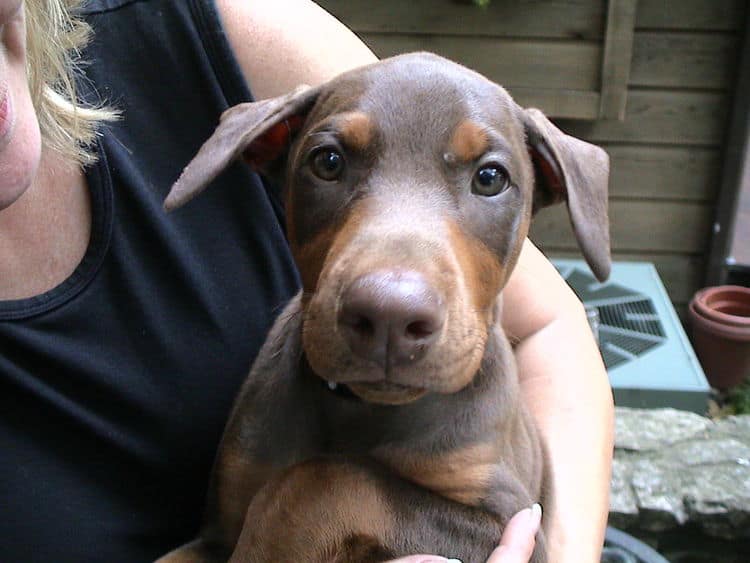
On a sad note, I lost my beloved 14 year old cat Calvin suddenly yesterday to congestive heart failure. It was a very tough day (and still is). I am so grateful Romeo was here. He is a good snuggler and his little kisses are so comforting. We are so blessed. He is a Godsend in more ways than one.
Take care,
Teresa"
|
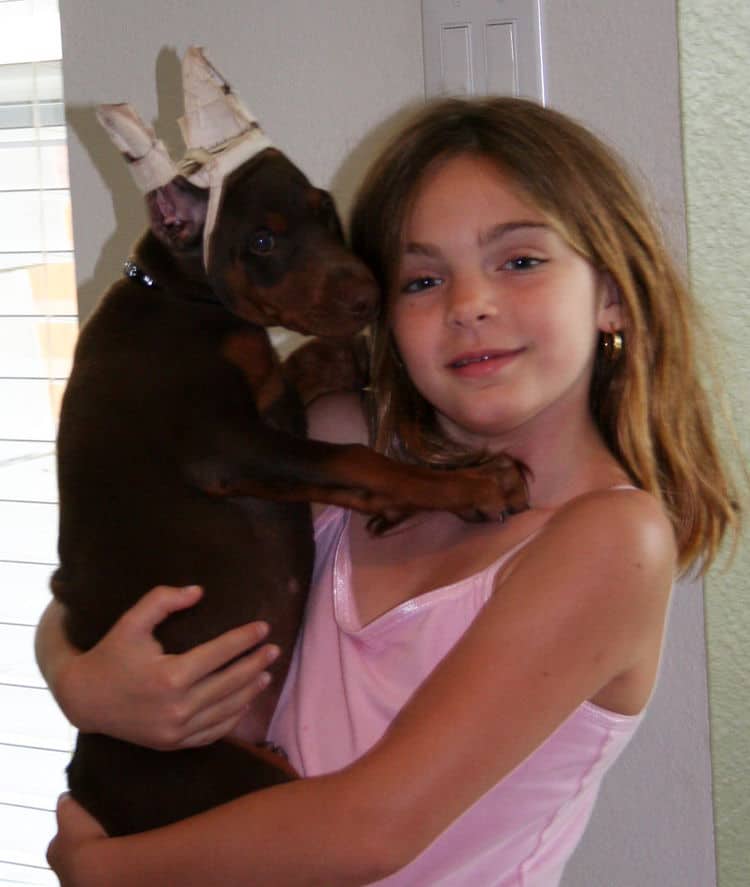
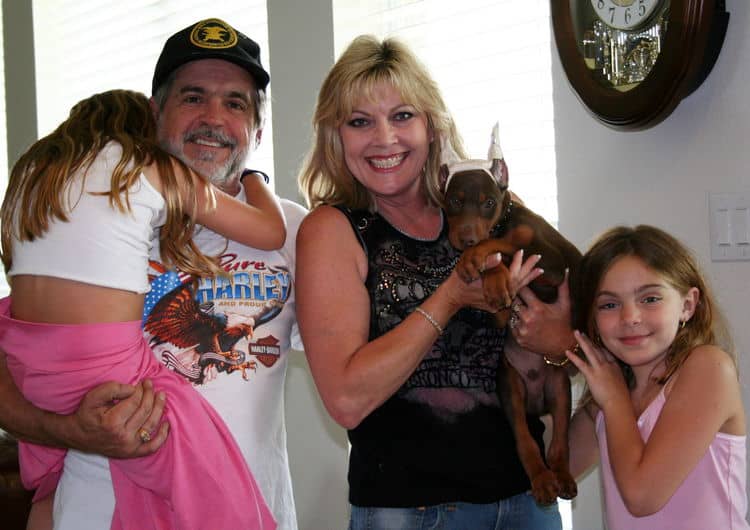
Hey Laura -- Thanks for taking these pics -
Can you tell we are HAPPY?!? Teresa
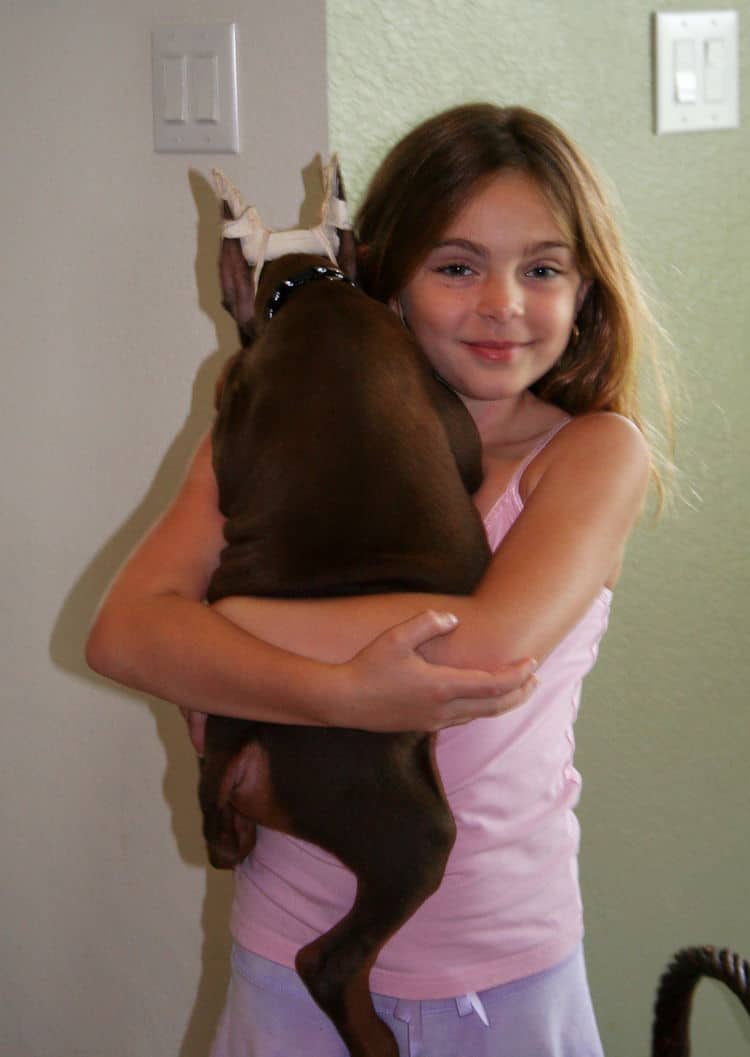
|
May 27, 2006 - Romeo goes home today! Richard drove his family up from Austin this morning to come pick their little lover! And, as suspected, it was love at first sight for Teresa.
|
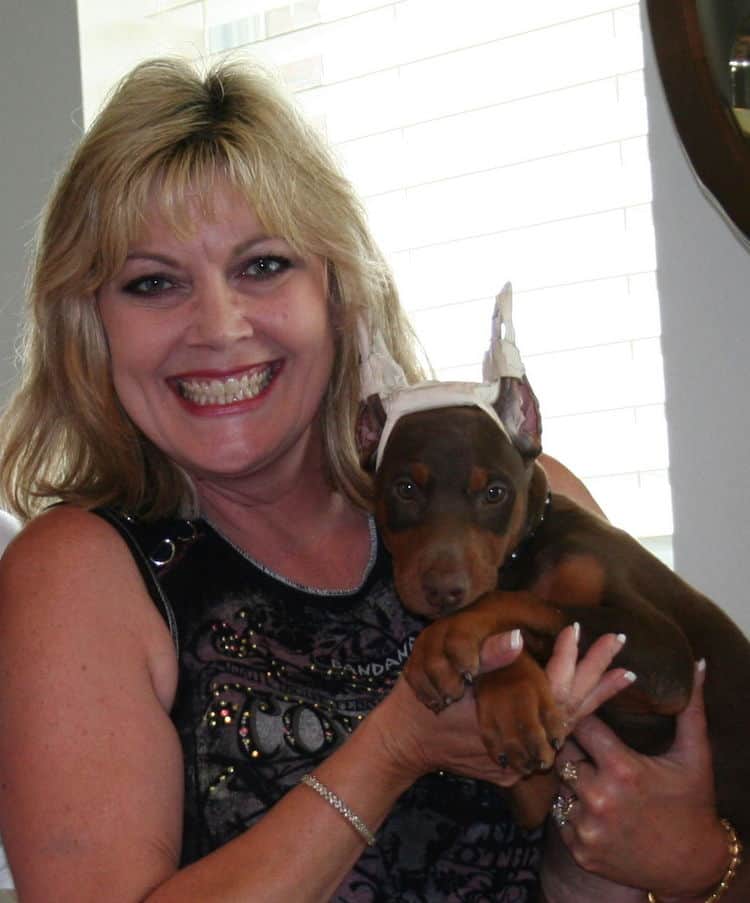
"Hi Laura,
We made it home safely and Romeo slept a good portion of the trip. He has been introduced to Skippy and all the kitties. He is having a ball running around the house exploring! He has eaten his supper and has already peed on the floor! HA! I guess he feels right at home now! We are so grateful, thanks again so much for everything. He is a little darling and will be quite spoiled, I'm sure!
I'll keep in touch and I'll send you pictures. Take care.
Teresa"
|
Pictures at 8 weeks ..
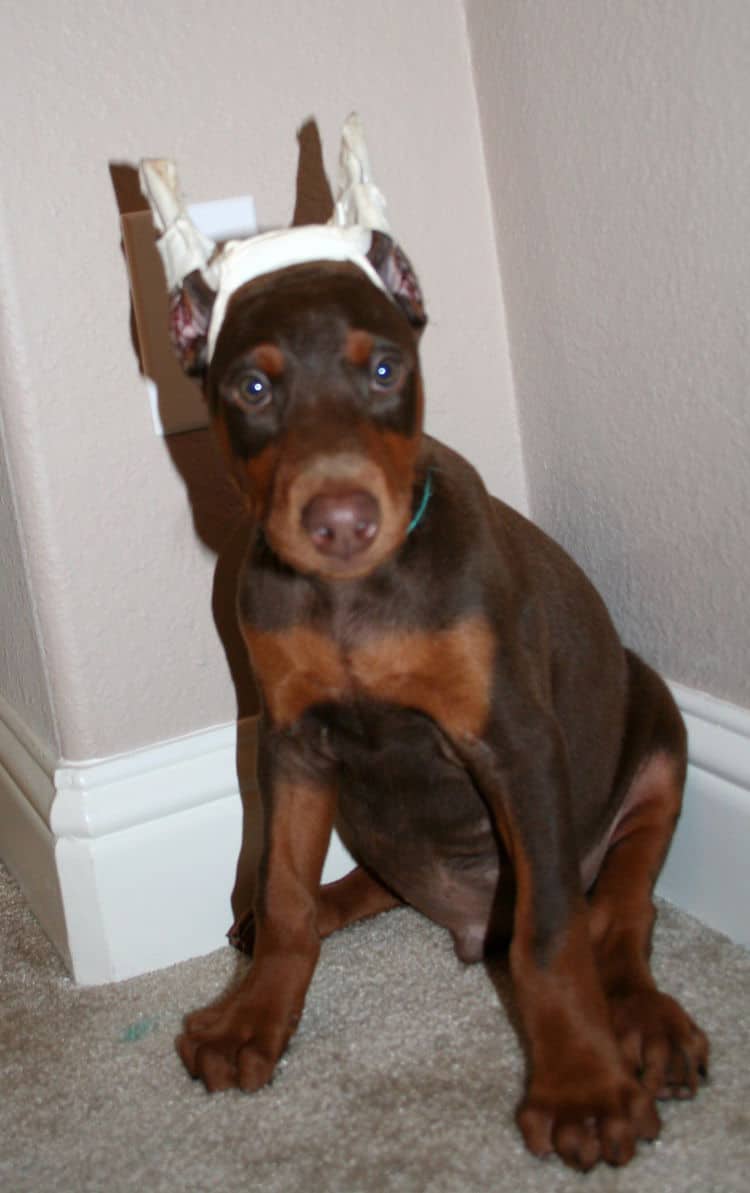
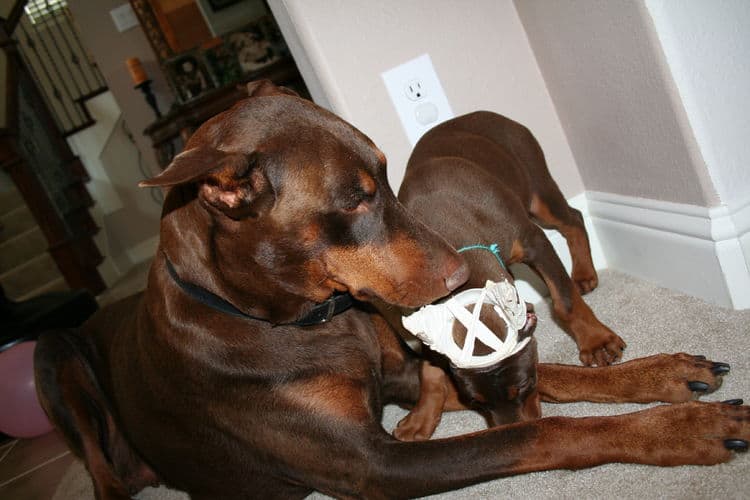
Mom is not real crazy about his being cropped.
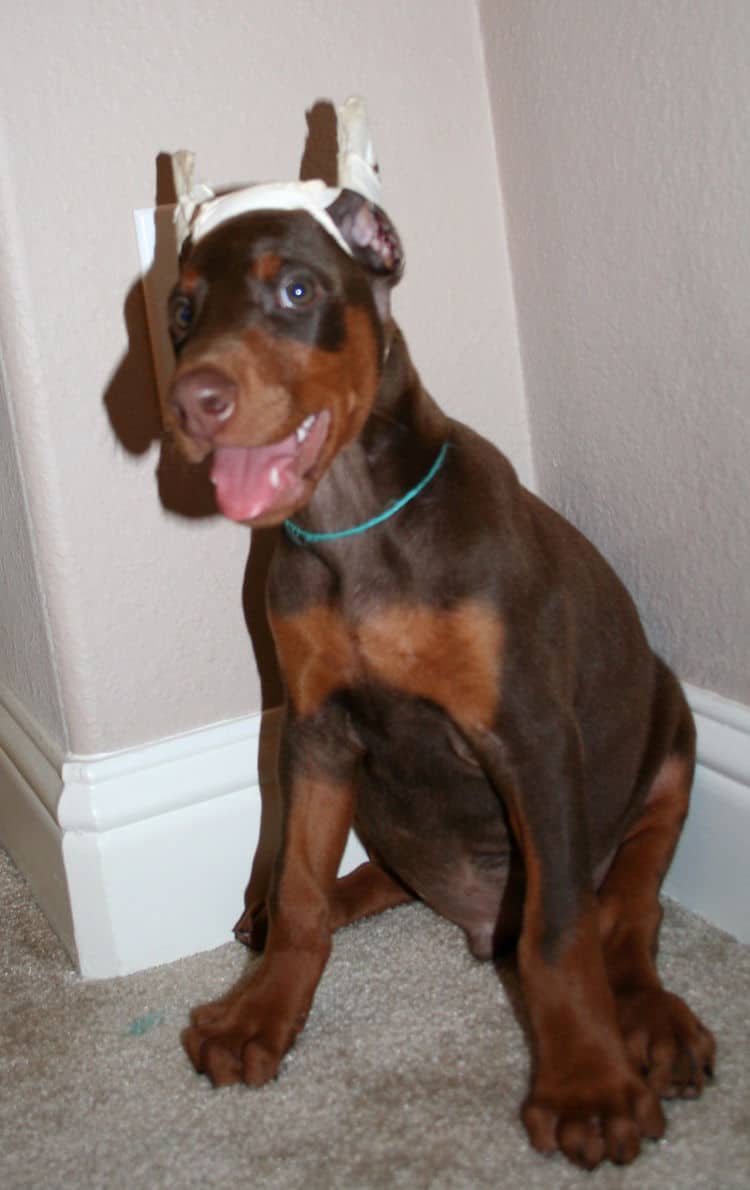
7 week old pictures ...
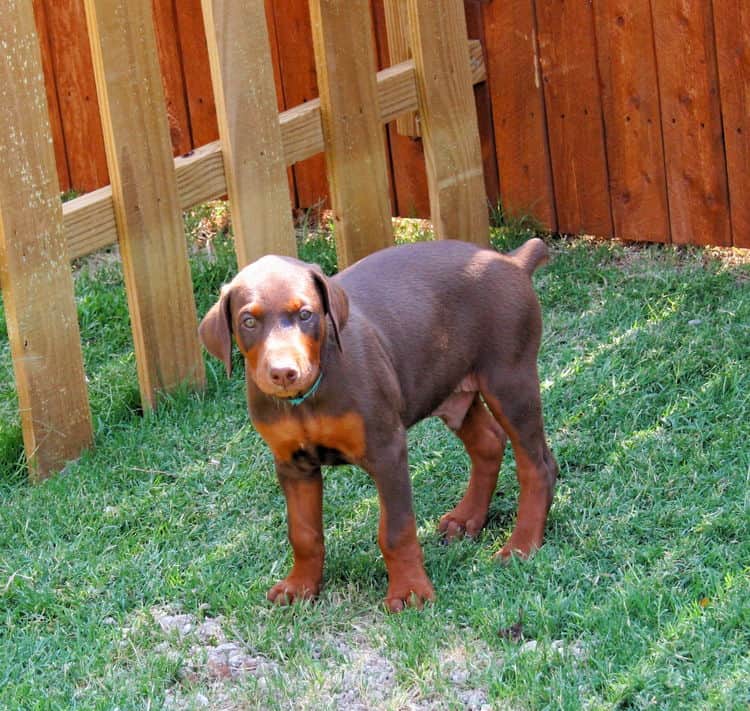

The following pictures taken at 6 weeks old ..
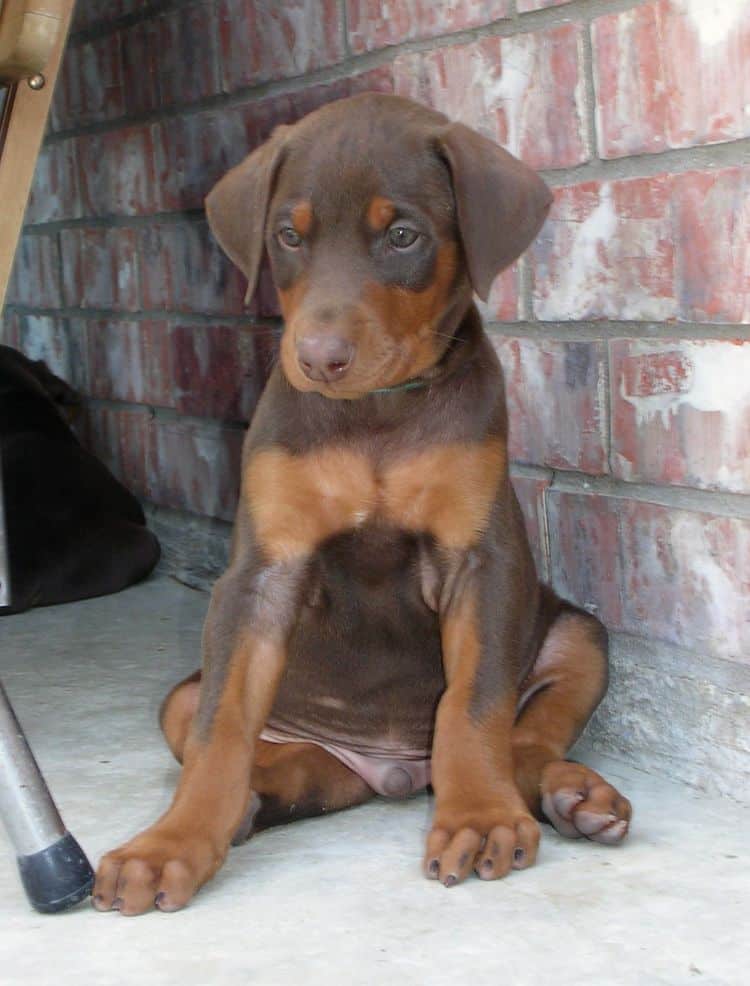
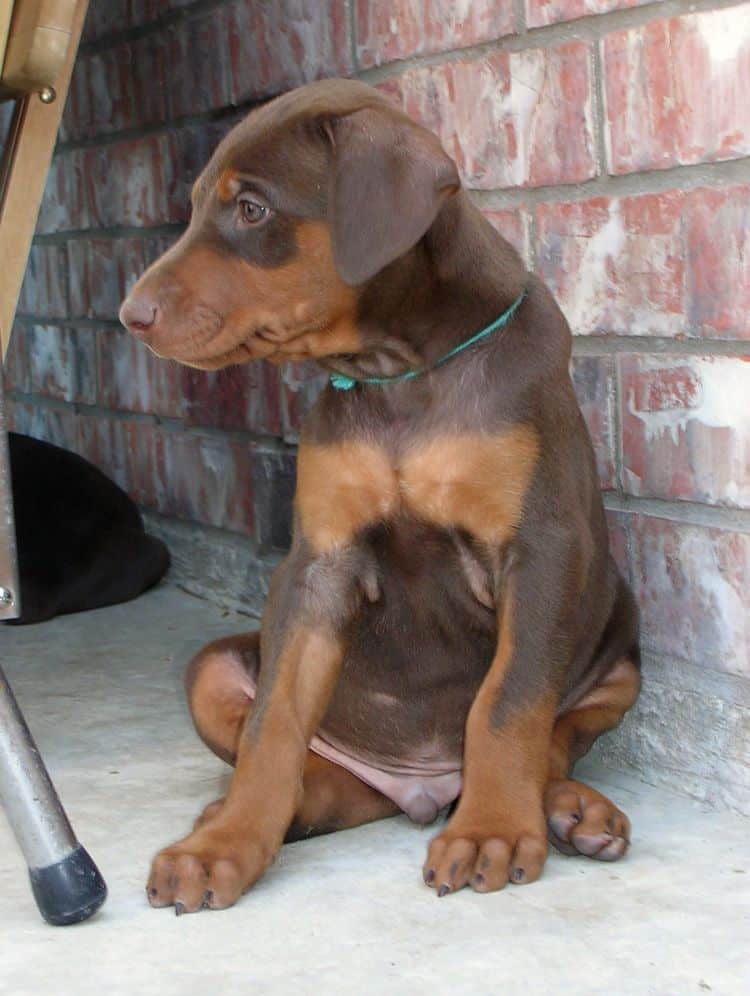
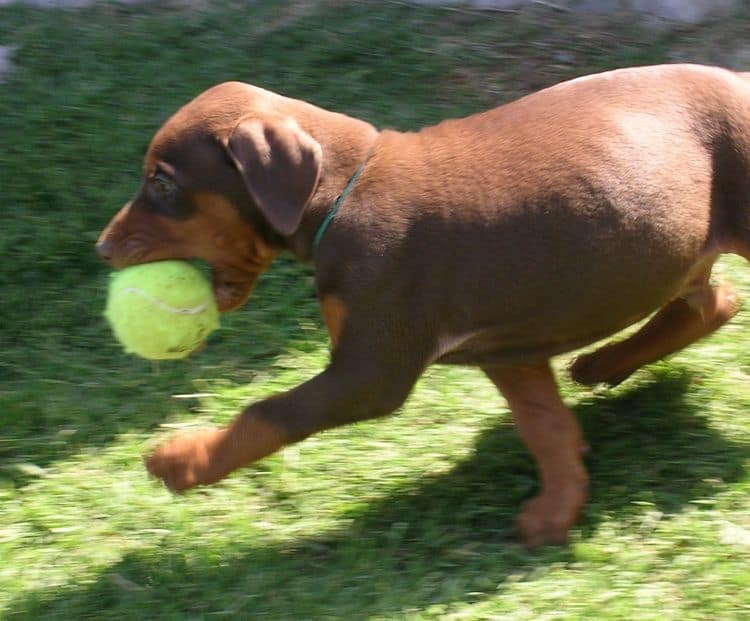
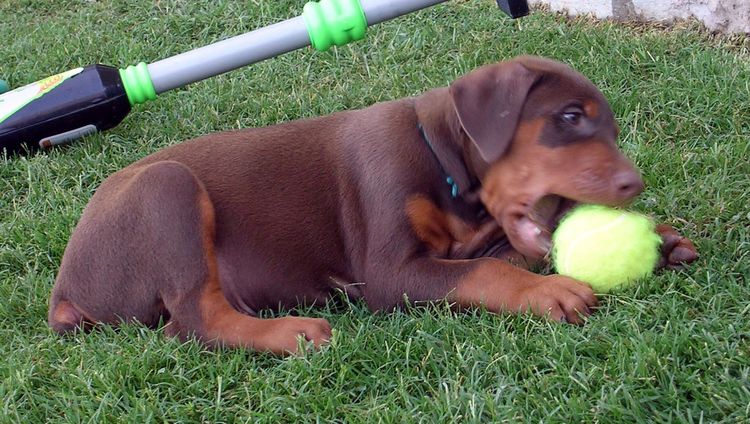
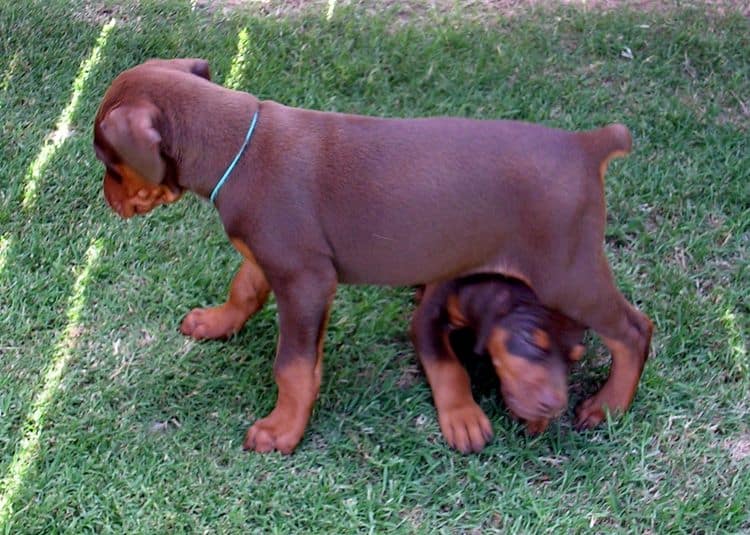
Romeo is using his larger size to his advantage!
The following pictures are at 5 weeks old ..
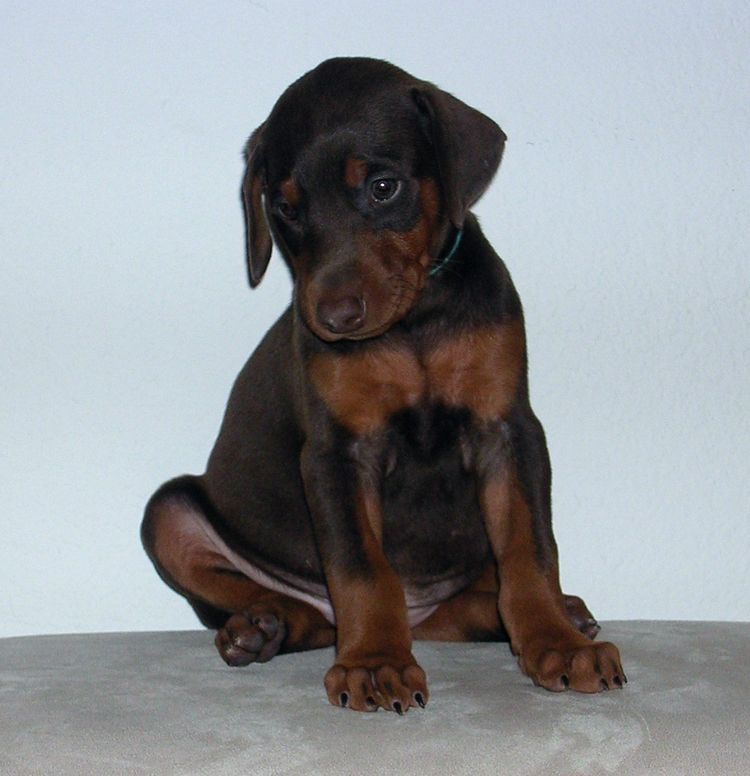
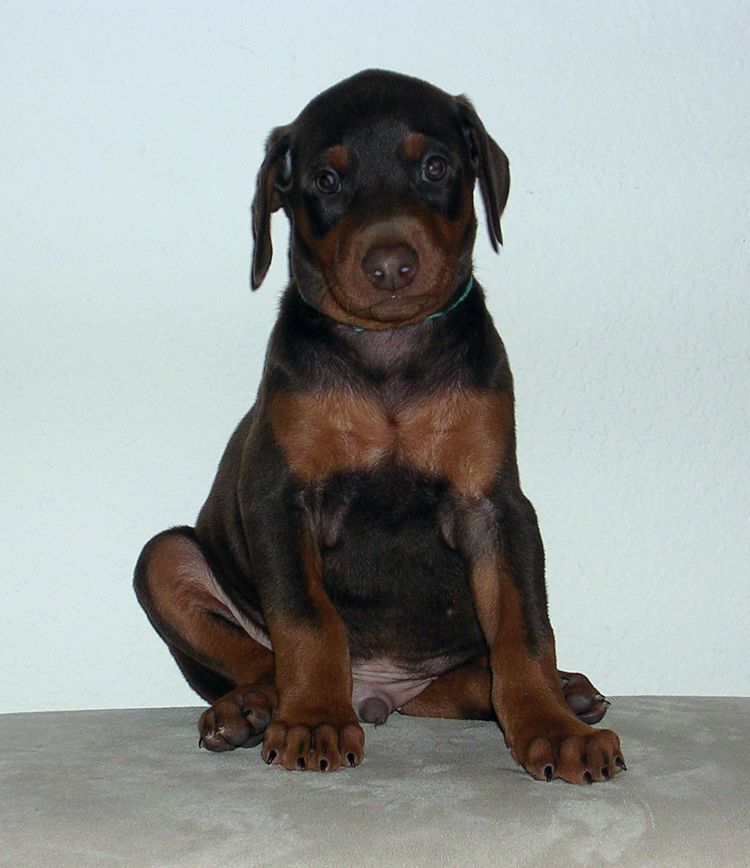
Pictures at 4 weeks old ...
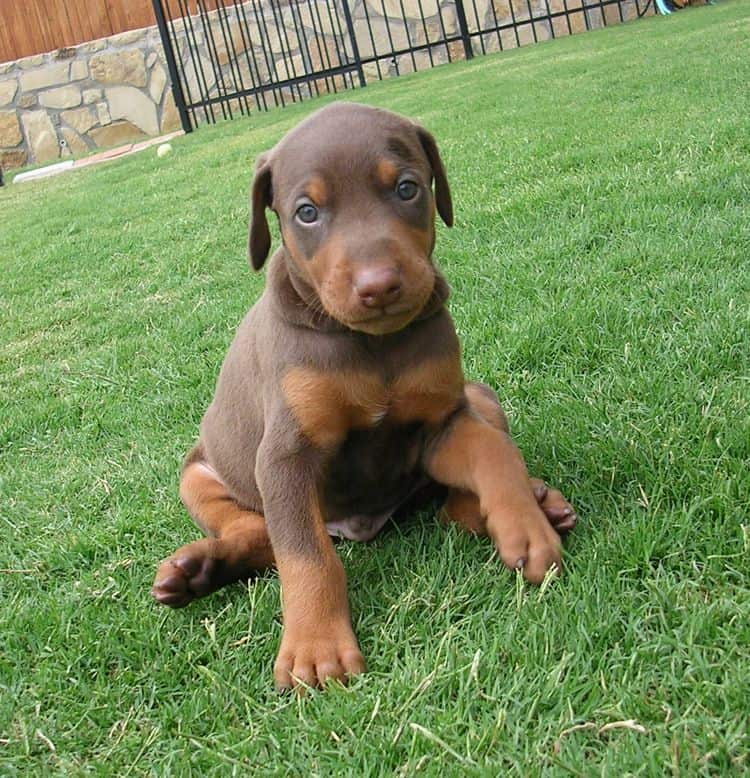
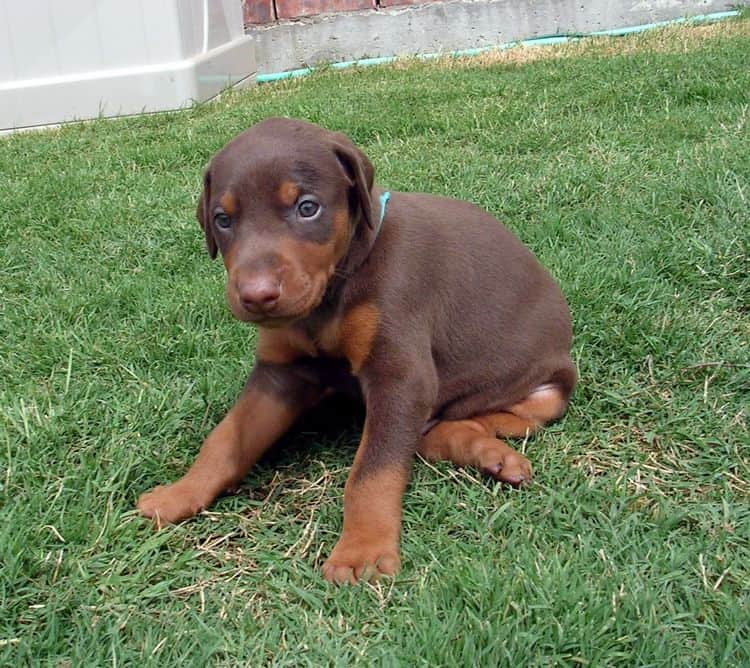
This is the largest pup in the litter.
He eats and sleeps a lot!
Click Here to see Romeo's mother
Click Here to see Romeo's father
Click Here to see Romeo's puppy page
June 1, 2006 -
"Hey Laura,
I was just perusing the site and saw the 8 week old pictures. WOW! SO CUTE!!!!!! I LOVE having access to the pic with Scarlett and Romeo. That is definitely one for the scrapbook! She is such a beautiful and loving Mom as is your gorgeous Aggie. Give her (and "Grandma") a big, wet kiss and hug from me.
Thanks for sharing. I can't wait to show all of our friends.
Best always,
Teresa"
RESPONSE:
"Yep, that was a pretty special moment to capture! Glad you liked it as much as I do! Laura"
|
May 9, 2006 -
"Hi Laura,
We are discussing the crop issue. We are probably going to have your vet do it but can we let you know tomorrow? I need to find a vet who will do follow up here in Austin. Also, if we have your vet do it, I'll send you a picture of Duster because that is
the crop we like (a medium).
Thanks, Laura!
Teresa"
RESPONSE:
"Definitely send the picture. That helps a bunch!"
REPLY BACK:
"Hi Laura,
We have decided that we would like your vet to crop Romeo's ears. I am more comfortable with someone doing it that does it all the time versus someone who only performs the surgery occasionally. I can find someone in Austin who can do follow-up - I'll contact breeders in our area and see if I can find information from them.
Below are pictures of my beloved Duster Boy when he was a youngster. I hope these can help you see what type of crop we prefer. It is a medium crop with a nice bell (like Scarlett's I think, just shorter). Duster's ears stood very quickly even though he was a fawn and everyone told me that I would have to be patient!!!! What is the average time you have experienced with your pups? Just curious since it has been a while since I had to do this and as I explained previously, the ears are a big deal to me.
Laura, thanks so much for everything. Just let me know which day you will schedule Romeo for and then we will pick a time to come and pick him up.
Oh, the 4th week pictures are great.
Best regards -- Teresa"
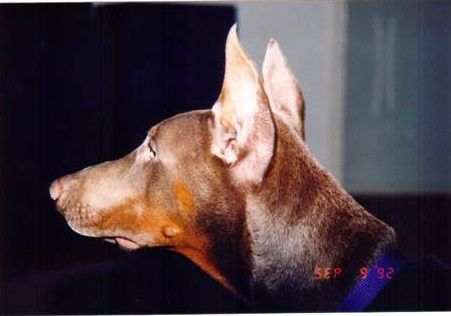
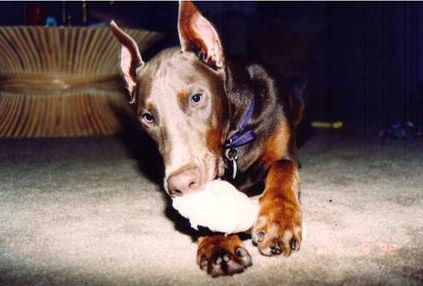
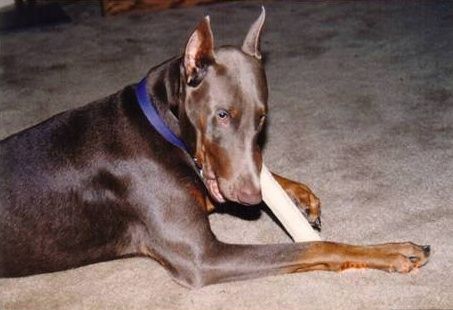
RESPONSE:
"Teresa,
Thanks for getting back to me on the ears. The crown would need to come off 5 days after the cropping. If you are not comfortable with taking it off yourself, you could have an appointment set with a vet to do it Monday morning. It is not a big deal to take it off. Just depends on how squeemish you are, I suppose. Then, the ears would need to be wrapped three days after taking the crown off.
The pictures of Duster are good -- thanks!
They should definitely stand up quicker with that crop.
He was a goodlooking dog!
I can't honestly remember the timeline you are looking at with the ears standing. I think around 4 to 6 weeks of wrapping. Towards the end, you would be wrapping until you are completely satisfied that both tips of the ears are not flipping down and the cup of the ear is well shaped.
Romeo is one of the calmest in the litter .. and the biggest!! He is a real sweetheart, a lover like you suspected! So, the name is fitting ;-) 5th week pictures are up and I will get Romeo's new pics up in just a bit.
I hope I answered all your concerns!?
Laura"
REPLY BACK:
"Hi Laura,
I am not squeamish - just show me what to do. After all, it is my baby! He is so handsome, I just can't wait to see him. The pictures are awesome and my heart is so full. I know I will cry all the way up there because of my Duster, but Romeo is going to fill a void that I have had for 3 years.
Duster was a gorgeous fawn, the pictures didn't have the best color - they were way too dark. Actually, he was the best looking fawn I've ever seen (just a little prejudiced, HA!). Not only that, he had the most unbelievable temperament - I don't know if he knew he was a Doberman, but he definitely knew he was a baby!!! It is obvious from letters on your web site that your little ones are the same. I am grateful I found out about you, Laura, as this has been a major decision for me. Losing someone you love so much is so hard. I've never been the kind of person who could just go out and "replace" as many people recommend. Duster was my child before I had my daughters. Romeo will be in remembrance of him and I believe you are right - he looks like a lover. Just too beautiful.
Thank you again so much.
Teresa"
RESPONSE:
"Teresa,
I just love that Romeo is going to a loving, caring person such as you. I hope he is able to bring back the happiness you lost with Duster's passing away. It is easy to see what a beautiful dog he was.
I can certainly show you what to do with the ears. Not a big deal since you are not squeamish!
Thanks!
Laura"
May 14, 2006 -
"Hi Laura,
I've e-mailed the pictures of Romeo to everyone I know and they are all so excited to meet him. I do want to talk with you by phone if it is o.k. to go over a couple of things about the ears. It has just been so long since I went through this that I want to make sure I don't do anything and screw it up!!
I can't wait to see Romeo's little face. Thanks so much for your kind words about my Duster. His passing was an incredible loss to me that I will never get over. When I think about him or when I look at his pictures, it still brings me to tears. I am so grateful that Romeo will be in my life. (He is supposed to be a family dog, but I think you get the picture - HA!)
I look forward to talking with you and especially to meet you.
Best regards,
Teresa"
|
April 19, 2006 -
"Hi Laura,
We are so excited about our puppy. Our girls loved the pictures that are posted on the web site. Just too cute. We have decided to name our pup Romeo (although Richard isn't thrilled) but we know he'll be a lover!!!! Thanks for the pictures and we just can't wait to meet our little sweetie pie!
Teresa Mathias"
|
April 10, 2006 -
"My children were wondering if you could email a photo of the little guy? Also, who would you recommend in Austin to crop the ears? If not in Austin, then what about in your area? I cannot remember the recommended age for cropping (12 weeks?)
The ears are a big deal to us so I want to make sure they are done correctly .. and in Austin, it seems no one is willing to do it anymore. Thanks for any info you can provide.
Richard & Teresa
RESPONSE:
"Richard,
I will get some pictures on the site soon. The pups eyes are beginning to open now and they are becoming much more aware of things.
As for ear cropping, I don't know of anyone in that area. Our vet does an excellent job and I could take him to her at 7 to 8 weeks
old. You can do it as late as 13 weeks. If you wanted to wait a little longer before having them done, you would definitely need to have them done in your area. Let me know what you want to do. I am open to whatever!
Laura"
REPLY BACK:
"Thank you Laura:
We will look forward to the pictures.
Richard"
|
January 24, 2006 -
"We just completed and sent an online application for Scarlett's April 2006 litter. We are interested in a red male.
Thank you,
Richard"
>> Notified of litter being born.
April 9, 2006 -
"Yes, we want the red male.
Thank you,
Richard"
RESPONSE:
"Richard,
Thanks for being so prompt in getting back to me. I am going mark him as yours on the site. Now, you just need to send the deposit. He can go home to you at 7 weeks -- so, sometime around May 20th. At around 4 weeks, you are welcome to come out for a visit.
I welcome questions so please shoot them my way anytime!
Congrats!
Laura"
|
|
All Content Copyright © 2000-present GarrettsDobermans.com.
All rights reserved.
|